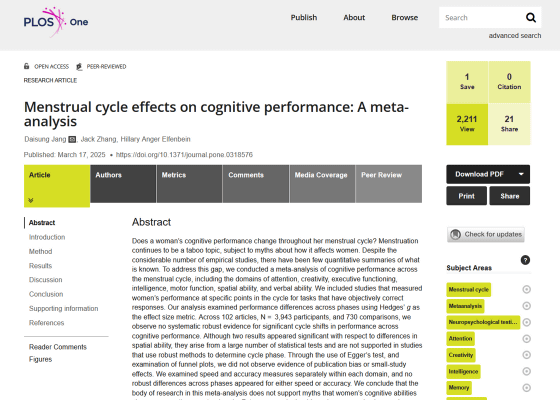Study finds that menstrual cycle doesn't affect women's cognitive ability

Menstrual cycle effects on cognitive performance: A meta-analysis | PLOS One
https://journals.plos.org/plosone/article?id=10.1371/journal.pone.0318576

Menstrual Cycles Don't Affect Women's Cognitive Abilities, Study Finds : ScienceAlert
https://www.sciencealert.com/menstrual-cycles-dont-affect-womens-cognitive-abilities-study-finds
Dysmenorrhea has a negative impact on many women, some of whom experience abdominal pain, nausea, bleeding, and anemia that make it difficult to go about their daily lives. However, research into the effects of the menstrual cycle on women has long been taboo, and although there are a considerable number of empirical studies, no quantitative research has been conducted on the relationship between the menstrual cycle and cognitive ability.
It is true that the amount of hormones secreted by women during menstruation, such as estrogen , progesterone , and luteinizing hormone , fluctuates, and these affect receptors throughout the body, including the brain. However, there was no clear scientific evidence to support the idea that 'menstrual women's cognitive abilities change.'
Therefore, a research team led by Daisung Jang , an assistant professor of management at the University of Melbourne in Australia, conducted a meta-analysis to analyze the relationship between menstrual cycle and cognitive ability by reviewing 102 peer-reviewed scientific papers that evaluated cognitive ability through the human menstrual cycle.

The meta-analysis used data collected from more than 4,000 menstruating women on tests of cognitive abilities, including attention, creativity, executive function, intelligence, memory, motor function, spatial awareness, and language skills. Papers containing variables that could confound cognitive abilities based on keywords such as 'pregnancy,' 'infection,' 'disability,' and 'cancer' were excluded.
The meta-analysis found that differences in women's cognitive performance across menstrual phases were small, inconsistent and of little meaning, meaning there was no evidence that women's cognitive performance is affected by menstruation.
'The lack of effect on cognitive performance is somewhat surprising, given the numerous documented physiological changes that occur across the menstrual cycle,' the team wrote. The findings suggest that the fluctuations in hormone levels may be too small to affect cognition, or that women's brains may somehow compensate for the decline in cognitive performance.

'Physiology does not appear to be a crucial determinant of cognitive ability. Our results have important implications for addressing misconceptions and myths and combating discriminatory practices, because we found no scientific basis for doubting women's thinking ability on the basis of their menstrual cycle,' the team said.
Related Posts:
in Science, Posted by log1h_ik







